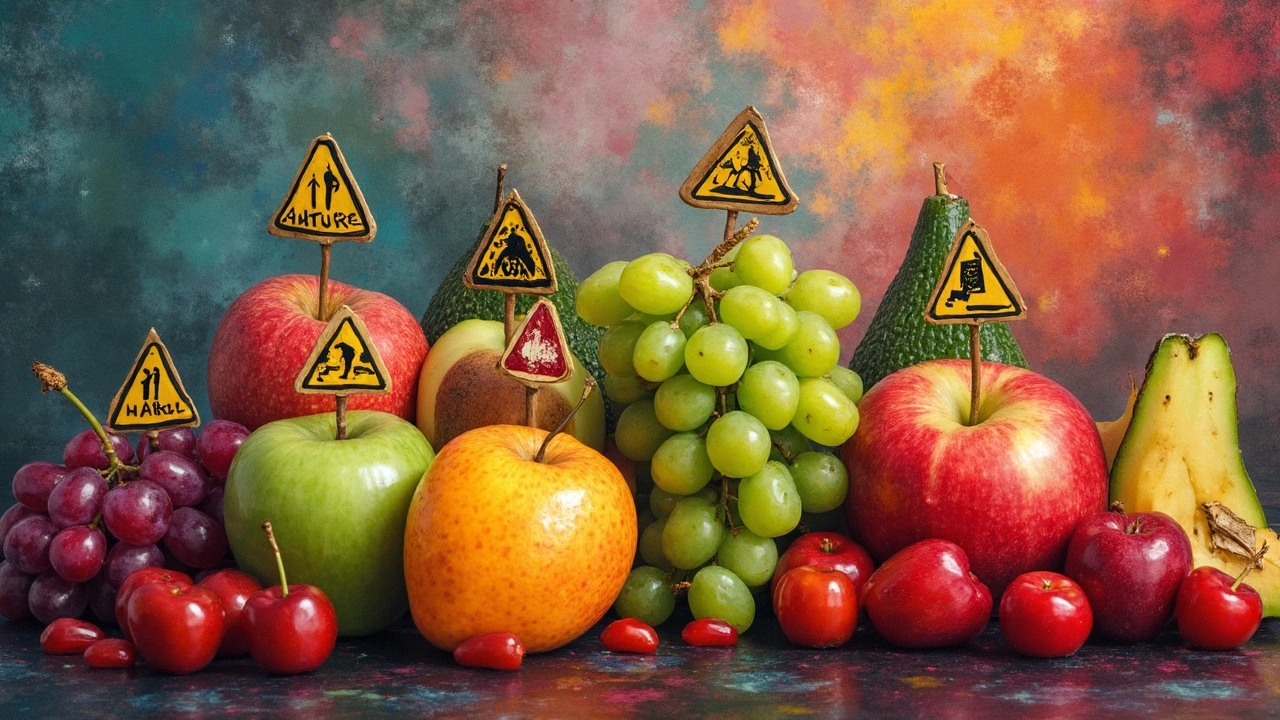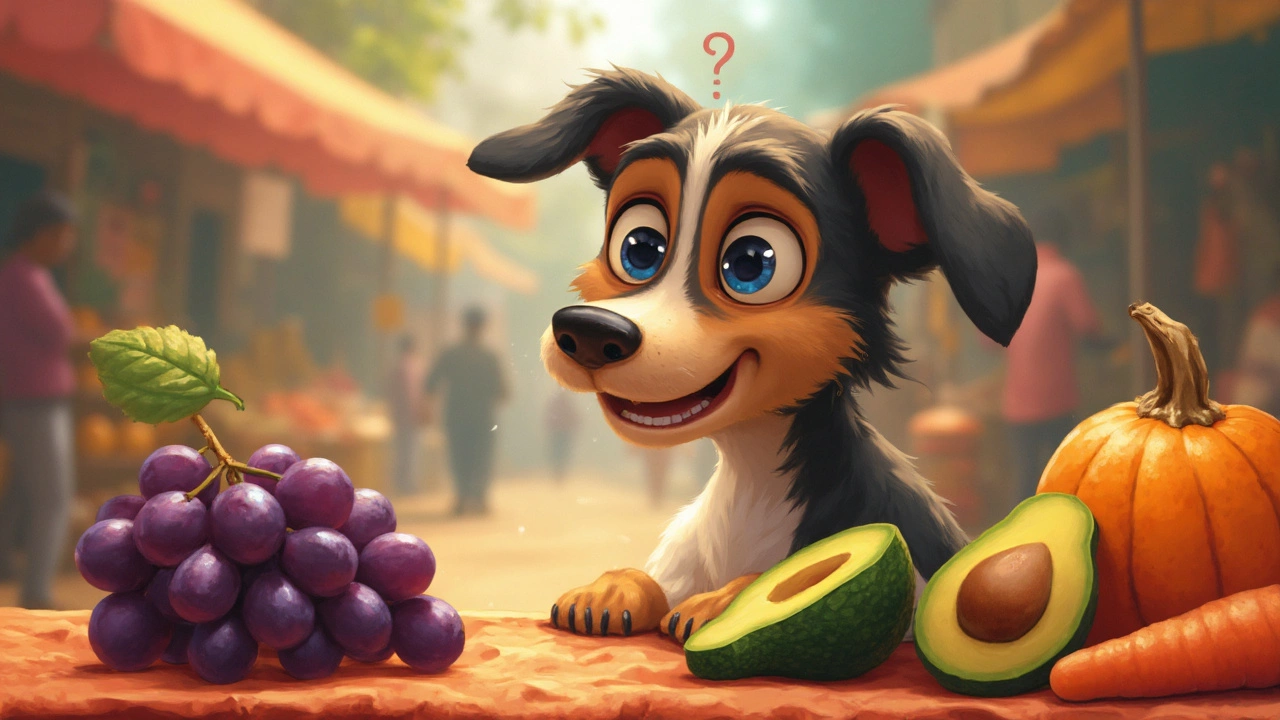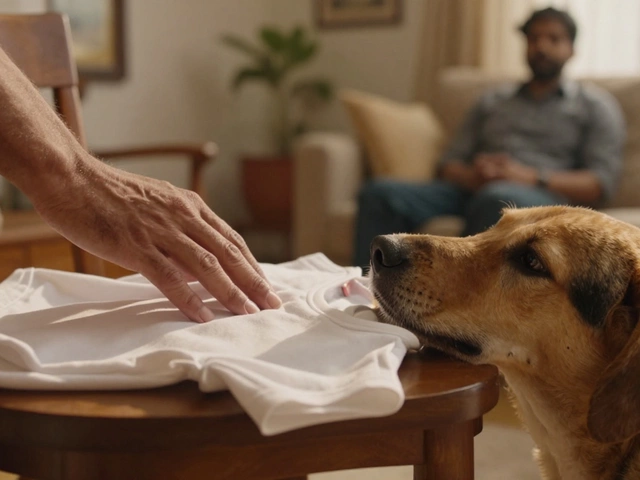
Been eyeing those fruits on your counter, wondering if you can share with your furry pal? Like you, I've often thought about this, especially when my kid, Wren, throws an apple to our dog like it's a tennis ball. But hold up, not all fruits are the perfect treat for dogs, and knowing which ones to avoid could save you an alarming vet visit.
Let's dive into the world of fruits that should never find their way into your dog's diet. Take grapes and raisins, for instance. These tiny delights might seem harmless, but they can cause some serious kidney damage in dogs. Even a small amount can be risky. How wild is that, right?
Then there are cherries – sure, they seem like a sweet treat, but the pits contain cyanide. It's like nature's way of saying, "Back off, pup!" But it’s not just the pit; the entire fruit isn’t ideal for your furry buddy.
Grapes and Raisins
Alright, so let's chat about grapes and raisins and why they're on the no-no list for dogs. As surprising as it seems, these little guys can be downright toxic for our canine friends. Don't be fooled by their small size; grapes and raisins can wreak havoc on a dog's kidneys. That's right, even a handful can lead to severe kidney failure.
No one really knows why these fruits are so harmful to dogs, which is a bit spooky, to be honest. But what's clear is the outcome: vomiting, lethargy, and eventually, kidney failure. Sometimes, a pooch might even stop eating. If you've ever seen a dog who normally devours his food suddenly turn his nose up at dinner, it can be pretty alarming.
So, what's the big picture here? If you're a dog owner, it's crucial to keep these snacks out of reach. Stash them high up where even the most curious pup won’t be tempted. Better safe than sorry, right?
Here's a quick lowdown on what might happen within hours if a dog eats grapes or raisins:
- Vomiting and diarrhea
- Lethargy and weakness
- Refusal to eat
- Abdominal pain
- Kidney failure, which can be life-threatening
If your furry friend gets ahold of anything grape-related, call your vet pronto. There’s no guarantee of how much is too much, but acting fast is your best bet. Your vet might recommend inducing vomiting or doing tests to see how serious the situation is.
Cherries
Cherries might seem like a sweet and tempting snack for your pup, especially when they're smacking their lips just watching you pop one of those ruby treats. But it's a case of look but don't touch for our canine friends. Cherries, in any form, can pose several risks.
The main issue with cherries is the pits. These little seeds contain cyanide, which is definitely not something you want in your dog's diet. It can be deadly in high doses if consumed. Plus, there's the potential choking hazard or risk of intestinal blockage from the pits – talk about a double whammy!
"Cherries, unlike other fruits, carry additional risks mainly due to their pits, which contain cyanide—a compound harmful to dogs when ingested in significant amounts," says Dr. Evan Antin, a well-known veterinarian.
Even if you decide to pit the cherries, they still aren't safe. The fruit itself can cause upset stomachs or diarrhea. Plus, cherries can lead to a rare condition called cyanogenic glycoside toxicity if consumed in large quantities.
Let's face it, nobody wants to end up at the emergency vet because their dog gobbled a handful of cherries. Instead of risking it, opt for dog-friendly fruits like blueberries or apples—without the seeds, of course.
- Remember, when it comes to fruits dogs can't eat, cherries are high on the list.
- Avoid all forms of cherries—whole, pitted, dried, or processed.
- If your dog eats cherries, monitor for signs of cyanide poisoning like difficulty breathing, dilated pupils, or red gums, and seek immediate vet care.
So next time you're tempted to toss a cherry to your pup, pause and think. Protecting their health is as easy as picking the right snacks.

Citrus Fruits
If you've ever craved an orange or grapefruit, you're not alone. Citrus fruits like these are a staple in our fruit bowls, offering a zesty flavor punch and a burst of vitamins. But when it comes to our dogs, while we might think sharing a segment or two is a kind gesture, it’s not always the best idea. Let's break it down.
Most citrus fruits are packed with citric acid and essential oils, which can lead to upset stomachs in dogs. While a small taste is unlikely to cause any significant harm, larger quantities or regular consumption can pose a risk. Ever noticed your dog scrunch their nose and back away at the smell of a peeled orange? It's almost like they know!
So, what's the logic behind this? The acid and oils in citrus fruits can irritate their gut. Think vomiting, diarrhea, and just overall discomfort. Plus, it’s always better to be safe than sorry.
The peels and plant material of citrus fruits are particularly problematic. If your dog munches down on a peel or two after you’ve enjoyed your citrus snack, it might lead to blockage, thanks to its tough, indigestible nature. Best to keep those out of reach.
While you don’t need to rush your pup to the vet for a lick of lemon, it’s definitely wise to keep them distant from your citrus stash. Safer fruits, like blueberries or apples (without seeds, of course), make much better choices for dog-friendly snacks.
Avocados
So, you're wondering about avocados, those creamy delights many of us love spreading on toast. Here's the scoop for your dog: avocados are a no-no. The main culprit is a toxin called persin. While not dangerous for humans, it can cause some stomach upset in dogs. Honestly, some breeds are more sensitive than others, but why risk it?
Now, let's chat about the seed. It's like a little cannonball just waiting to be swallowed! If your dog gets ahold of it, there's a chance of a choking hazard or even an intestinal blockage. Trust me, that's not the kind of adventure your pup needs.
And the skin? It's tough, difficult to digest, and can contain higher amounts of persin. Keep that out of reach, too. So, when you're whipping up some guacamole, it's best to keep Fido away. Stick to safer snacks and dog health will be one less worry on your plate.
But hey, don’t feel bad if you've slipped some avocado your dog's way before. It's a common mistake and you're not alone. Just focus on finding other fruits and veggies that are both safe and tasty for your canine buddy. Curious about a few options? Think blueberries and carrots – both winners in the world of safe dog snacks!

Other Lesser-known Fruits
Avoiding some of the lesser-known fruits might just be the extra mile you need for your pup's safety. Most dog owners know about grapes and raisins, but what about persimmons or starfruit? These don't always make the list, but they should definitely be on your radar.
Persimmons, with their tempting orange hue, can upset a dog's stomach. The seeds and pits in particular can lead to intestinal blockages. It's like signing your pup up for an unwanted trip to the loo!
And then there's starfruit. You might love it in your salad, but it wasn’t made for your dog. Starfruit can lead to kidney issues, especially in smaller dogs.
If in doubt, “it's always better to err on the side of caution,” says Dr. Emily Wilson, a well-known vet from Pet Health Weekly. She stresses the importance of keeping an eye on what our pets eat.
Here's a quick rundown of other fruits to keep off your dog's menu:
- Apricots: The pit is not just a choking hazard; it also contains cyanide, which, let's be honest, is not something you want in your dog's life.
- Tomatoes: While the ripe fruit can be okay in small amounts, the green parts and unripe tomatoes can be toxic, causing all sorts of upset.
- Plums: Spooning out the flesh might be fine, but avoid the pit like the plague—cyanide strikes again!
Keeping these fruits out of reach doesn’t just give you peace of mind; it’s a smart move for your dog’s well-being. Now, all this doesn’t mean that fruits are a no-go entirely. Always reach for options like apples (without seeds!), blueberries, or bananas—your dogs will be wagging their tails in appreciation!


